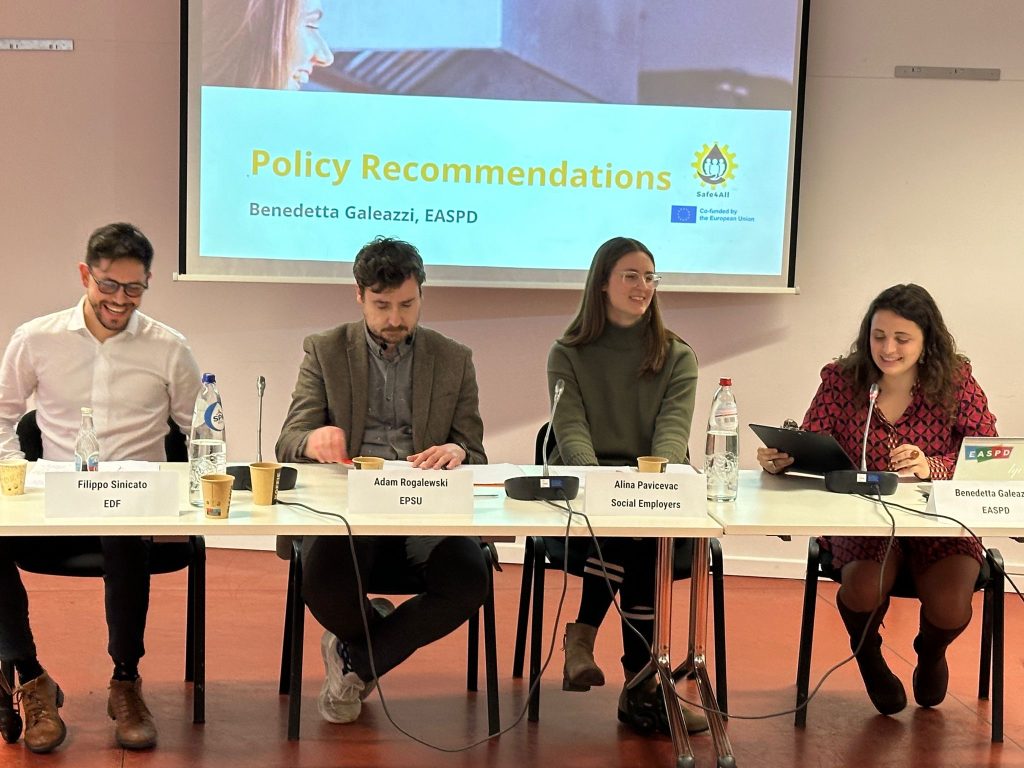On 20 February, EASPD hosted Safe4All’s final conference “Enhancing equal participation of people with disabilities in the workplace”, which marked the conclusion of the project’s journey. Policy experts and professionals working in Safety & Health training gathered in Brussels to explore the practical tools developed by Safe4All to foster safer workplaces for all workers, especially those with disabilities. The event was divided into three parts.
Part 1
To kick off the event, the participants were welcomed and introduced to the project by three representatives of the partner organisations: Rachel Vaughan (EASPD), Francesca Dadomo (Project Coordinator, IMPULSA IGUALDAD) and Estefania Lopez (SGS). The speakers highlighted the need to fully include persons with disabilities in the workplace and to promote their safety and well-being. To achieve this, it is crucial that health and safety courses are tailored to meet the specific needs of persons with disabilities. The speakers shared the key results of the project and lessons learnt from the piloting activities.
Part 2
The metacognitive approach to learning was further developed during the training workshop on delivering Safety & Health in the workplace for persons with disabilities, which was conducted by Louise Van Laere (Groep Ubuntu). The workshop highlighted that the style of teaching is just as important as the content: in order to maximise the potential of students, effective training must focus on the “how” as well as on the “what” of learning. Participants took part in two interactive exercises. These simulated individual reflection and discussions in smaller groups. Then, Louise moderated a whole group conversation where the different groups shared their ideas, thoughts and questions.

Part 3
To end, Benedetta Galeazzi (EASPD) moderated a Policy Panel on the creation of the right policy frameworks to ensure that everyone has access to safe working environments. With the aim to implement inclusive Safety & Health policies, the Panel shared a series of recommendations for EU stakeholders and national authorities:
- Mandate inclusive Occupational Safety & Health training;
- Revise existing Occupational Safety & Health regulations and standards;
- Establish ad-hoc data collection and reporting requirements;
- Raise awareness and foster knowledge sharing.
The expert speakers in this panel were:
- Adam Rogalewski, European Public Service Unions (EPSU)
- Alina Pavicevac, Social Employers
- Filippo Sinicato, European Disability Forum (EDF)
To kick off the conversation, the three panellists gave their first impressions on the recommendations, which were overall positive. They recognised the importance of the issues raised in the paper.
EPSU emphasised the importance of legislation. They are calling for the development of a dedicated directive on Psychosocial Risks and of an individual directive on Musculoskeletal disorders (MSDs). Furthermore, Adam Rogalewski highlighted the need to support labour inspections.
EDF stressed the need for ensuring the provision of reasonable accommodation and shared their experience with OSH related data collection. Filippo Sinicato made reference to their ongoing project with Google on enhancing digital skills for employment, as accessibility in the workplace is no longer just a matter of the physical space in this age of rapid digitalisation.
Social Employers warned that risk assessment in the workplace cannot be reduced to a box-ticking exercise, nor focus solely on technical aspects. A comprehensive and inclusive assessment should also consider the wellbeing of workers and service users, as well as the specific risks related to different disabilities. Alina Pavicevac concluded by pointing out that social partners should work together on this issue, as it is a shared concern that should not be top-down. EASPD shares this opinion and looks forward to more fruitful shared endeavours to promote inclusive health and safety policies in Europe.
All project results and materials developed by the partners can be consulted for free and are translated in 6 languages (English, Dutch, German, Italian, Norwegian, Spanish). To access these valuable resources, click here.